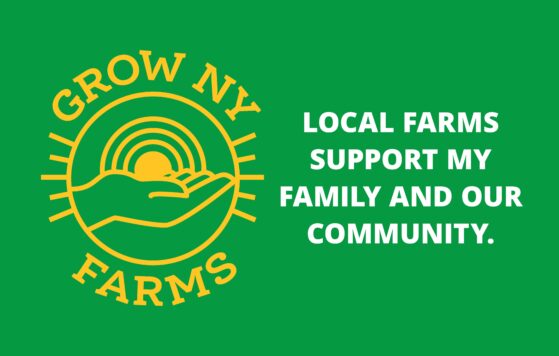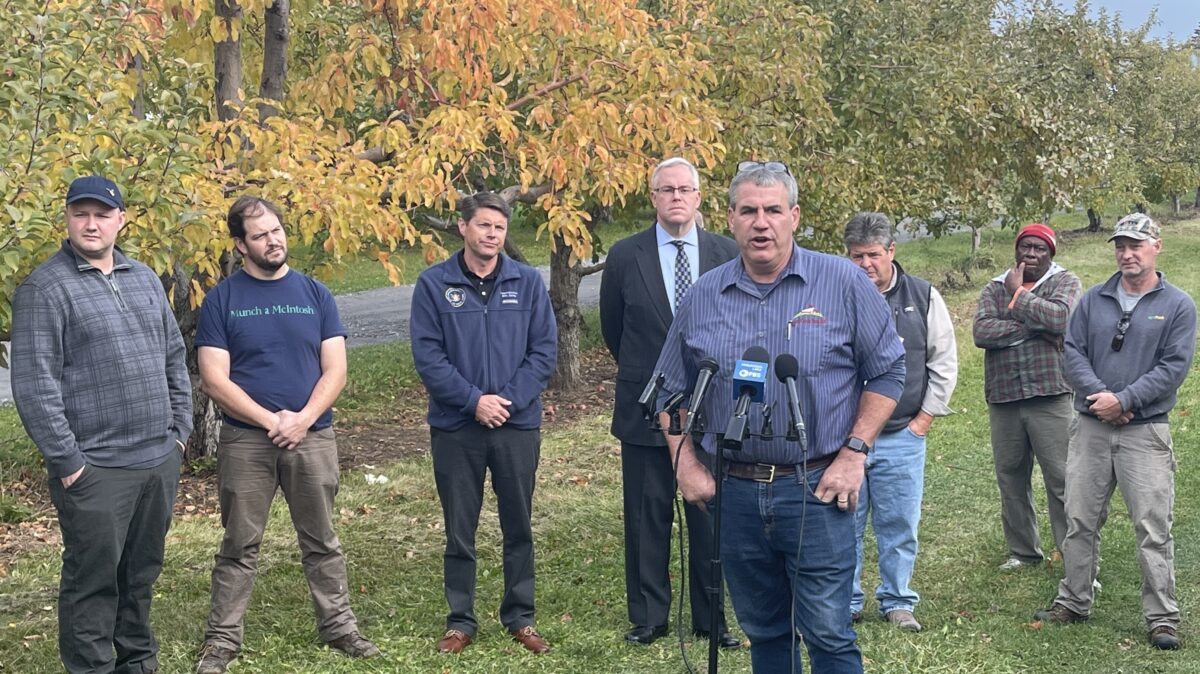Grow NY Farms Highlights Farmworkers’ Role in Food Security and State’s Economy
Labor is a concern for farmers across the country, but a proposal to lower the state’s overtime threshold for farmworkers from 60 hours a week to 40 hours a week had New York farmers especially concerned. Farm work, much of which is seasonal, often requires longer hours over a few weeks at a time. Rather than protect farmworkers, the overtime proposal threatened to put New York farms out of business, cutting New Yorkers off from locally grown produce, dairy products and more – and threatening the 160,000 jobs the state’s 35,000 farms support.

To demonstrate how New York’s farm community has direct bearing on urban, suburban and rural consumers and the economy of the state – and how these labor proposals were jeopardizing this, New York Farm Bureau helped bring together several state agricultural organizations and local businesses in 2021 to create “Grow NY Farms.”
Grow NY Farms created a 15-member farmer advisory group who represented the various commodities and organizations involved in coalition. The group served as a sounding board for Steve Ammerman, New York Farm Bureau director of communications, and other coalition leaders.
“We would bounce our ideas off the advisory group, work on messaging with them and prepare them all to serve as spokespeople. They were involved throughout the entire process,” Ammerman said.
While coalitions aren’t usual, Ammerman said Grow NY Farms took a novel approach, addressing all the angles of farm labor, including the workers’ stories.
“Our farmers had great stories to tell but so did our farmworkers. They shared why their jobs and their hours were important to them. They were worried their hours would be cut if the state put a 40-hour overtime threshold in place. Many of them come from outside the country for seasonal work. They’re here for a short period of time and they want to work as many hours as they can," Ammerman explained.
Grow NY Farms put farmworkers front and center in their campaign, which included a large social media effort directed toward two audiences: urban areas – especially New York City – and Upstate New York. The messaging for urban centers focused on food insecurity, the importance of buying local and why farmers and farmworkers should be able to work the hours they need to.
When consumers viewed the paid ads and boosted posts on social media, they were taken to Grow NY’s e-lobby site, which would connect them to their own lawmaker’s website.
Grow NY Farms shared several short videos explaining the important role farmworkers play on all types of farms across the state.
In addition, Grow NY Farms hosted several news conferences, highlighting both farmers and farmworkers. They also tapped into their political supporters for these and other events. A letter-writing campaign resulted in hundreds of letters in English and Spanish being hand delivered to the governor’s office by the coalition.
The coalition emphasized the role farmers and farmworkers played in food donations, which had been critical to so many New Yorkers during the pandemic.
“Food donations at the level at which they occurred during the pandemic would not have been possible if farmers and farmworkers weren’t doing their jobs or if they didn’t have the income and labor to donate, package and transport those products,” Ammerman said, explaining that this message resonated with lawmakers who otherwise would have been opposed to agriculture’s position on the overtime proposal.
While Grow NY Farms did not achieve its ultimate goal of preventing a lower overtime threshold from being put in place, the coalition was successful last year in extending the timeframe for implementation, giving farmers a runway of 10 years, spread out as a four-hour reduction every two years.
“More importantly, our efforts help the governor recognize the financial impact this was going to have on our farms and she put forth a refundable tax credit that would offset the overtime cost between 40 hours and 60 hours. Our farmers would be refunded that money, including if they needed to borrow money to cover the payroll costs upfront. Having 118% of those overtime costs refunded to them was a significant victory,” Ammerman said.
Other wins for New York Farm Bureau included strengthening ties among the state’s agriculture organizations, building relationships with political leaders they may not have otherwise aligned with, and raising the profile of the organization, especially with traditional media and social media users.
The Grow NY Farms coalition continues to advocate on farm labor issues, including pushing back on another proposed minimum wage hike in New York State.
New Horizon Award
Grow NY garnered New York Farm Bureau a 2023 New Horizon Award from the American Farm Bureau Federation. The award, which honors state Farm Bureaus with the most innovative new programs, is presented annually at the AFBF Convention.
Top Issues
VIEW ALL